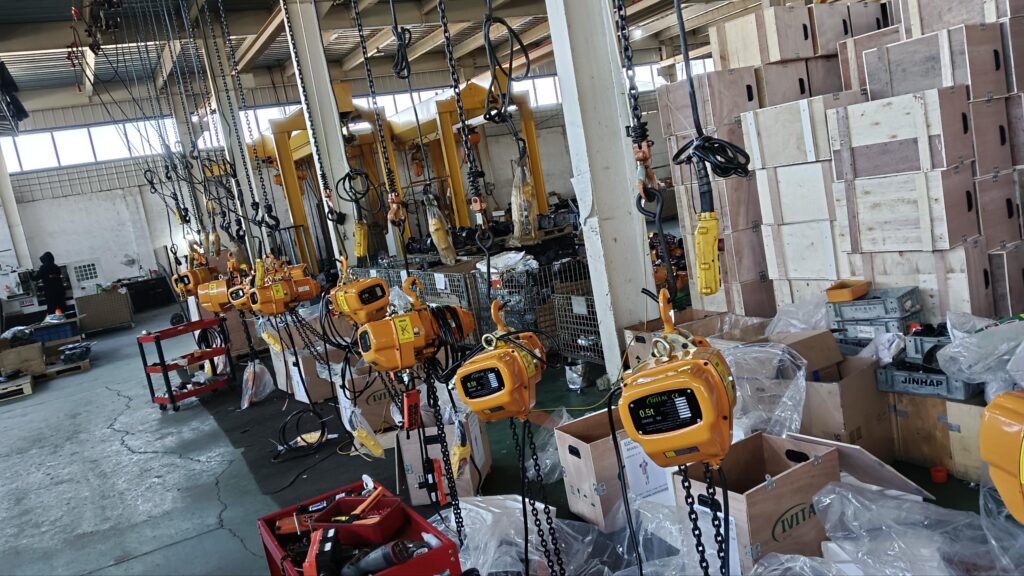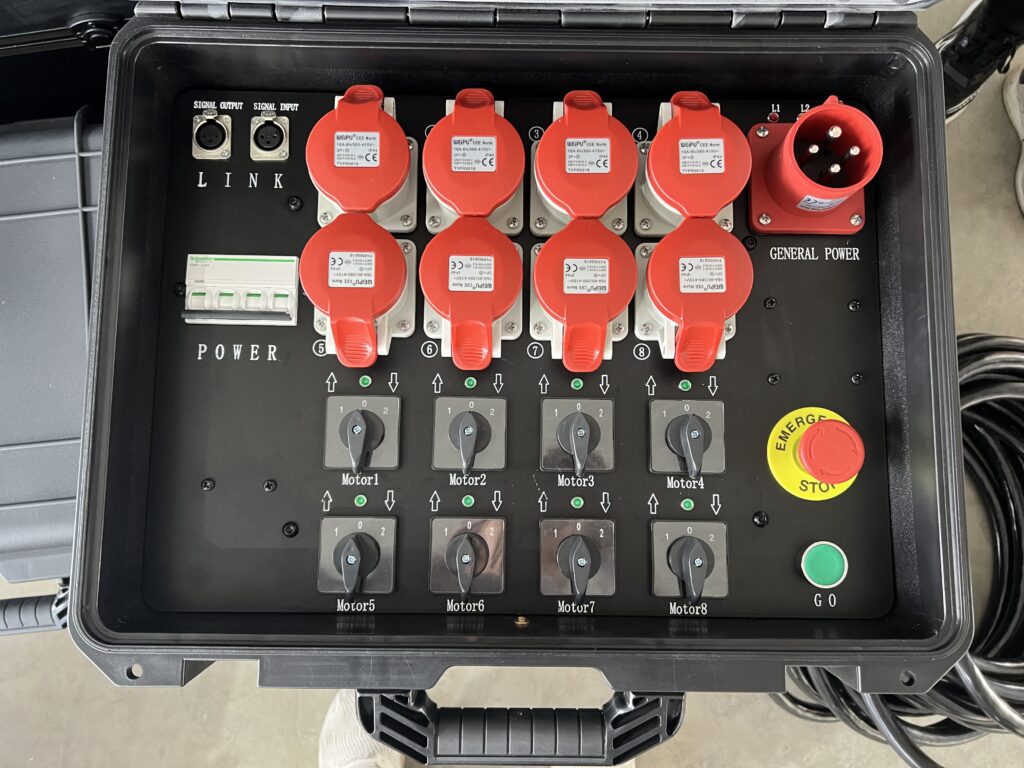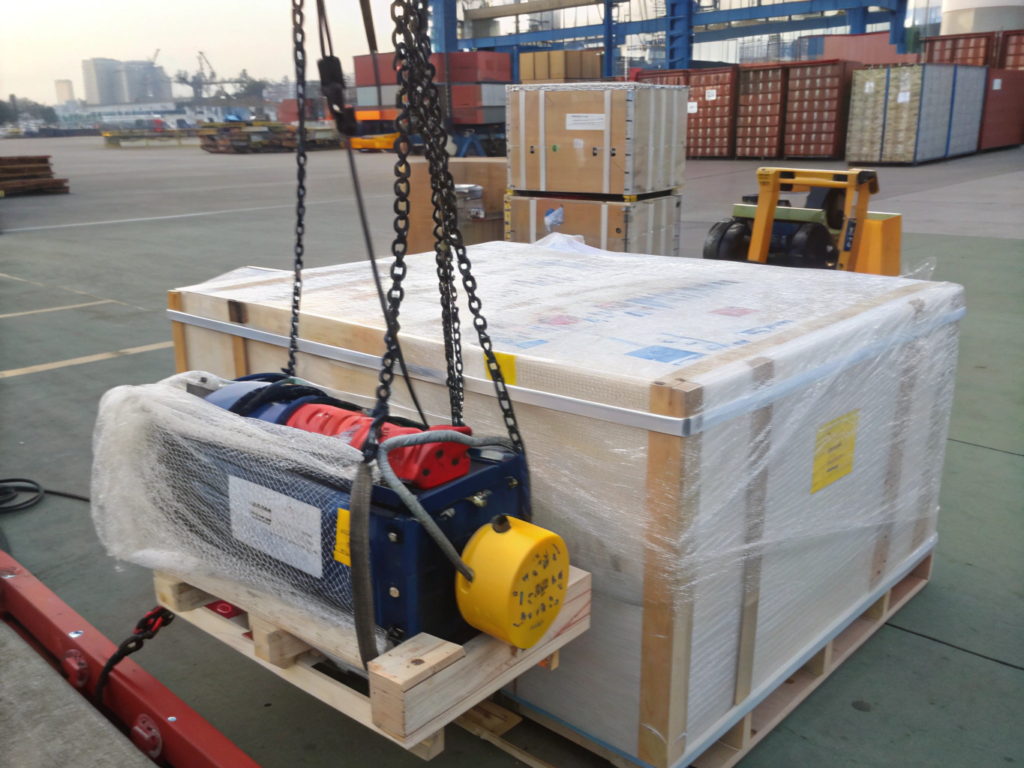The hoist might be tough—but shipping damage is real.
Yes, electric hoists must be packaged in wooden crates with inner cushioning, moisture-proof layers, and reinforced supports to ensure safe sea transport. Fragile components require extra shock protection.
I’ve seen too many shipments arrive with dented control boxes and loose hooks. All because someone used bubble wrap instead of blocking foam. Let’s get it right.
[Table of contents]
- How should I pack an electric hoist for sea freight?
- What packaging standards apply to industrial equipment exports?
- How to protect fragile parts like controllers or limiters?
- Do I need moisture protection for sea transport?
- What should be included in the export packing list?
How should I pack an electric hoist for sea freight?
You need more than just a cardboard box.
Electric hoists for export must be crated in ISPM 15-compliant wooden boxes, reinforced with bracing, lined with cushioning, and properly secured to avoid movement.

Dive Deeper
Standard practices include:
- Thick plywood or pine frame for crate structure
- Foam or rubber blocks between hoist and box walls
- Steel banding to hold crate together
- Anchoring bolts to fix the hoist inside the box
- Forklift guide slots for safe loading/unloading
What packaging standards apply to industrial equipment exports?
Most industrial exports follow global logistics guidelines.
The key standards include ISPM 15 for wood packaging, ASTM D4169 for performance testing, and shipping marks for international compliance.
Dive Deeper
| Standard | Covers What | Notes |
|---|---|---|
| ISPM 15 | Wood crate fumigation + stamping | Required for most countries |
| ASTM D4169 | Drop, vibration, compression tests | Used in test packaging labs |
| UN/CEFACT | Export documentation labeling | For customs and port checks |
Always verify country-specific packaging laws, especially for wooden materials.
How to protect fragile parts like controllers or limiters?
Treat these like glassware, not metal.
Use foam inserts, anti-static bubble wrap, and vibration-absorbing padding around fragile components such as pendant controls, relays, and electrical boxes.

Dive Deeper
- Wrap the control box in 3-layer EPE foam + zip-tie to a corner bracket
- Encase the hook in rubber sleeves to avoid metal clash
- Place limiters or sensors in plastic sub-boxes with labeled “Fragile” stickers
- For wireless controllers, consider anti-static bags and dry packs
These extra steps can prevent warranty claims and shipment rejections.
Do I need moisture protection for sea transport?
Yes—especially for electrical equipment.
Apply a moisture barrier (PE bag with silica gel) around the hoist, or use vapor corrosion inhibitor (VCI) film if stored long-term in port.
Dive Deeper
Moisture-proofing checklist:
- 🟢 Heat-sealed plastic bag over entire hoist
- 🟢 2–3 silica gel packs inside crate
- 🟢 Pallet bottom lined with plastic sheeting
- 🟢 Desiccant canisters for larger crates (optional)
Without moisture protection, expect rust on load chains or motor housing after 30+ days at sea.
What should be included in the export packing list?
Your packing list helps customs and warehouse teams verify your cargo.
A complete packing list should detail the crate dimensions, net/gross weight, internal item list, HS code, and handling instructions.
Dive Deeper
| Field | Example Value |
|---|---|
| Package Type | Wooden Crate (ISPM15 Stamped) |
| Dimensions | 1200x800x700 mm |
| Gross Weight | 185 kg |
| HS Code | 8425.19 |
| Internal Items | Hoist, Pendant, Hook, Manual |
| Handling Markings | “Fragile”, “Keep Dry”, “Top ↑” |
Label both sides + top of the crate. QR codes or barcode labels also help during port transfer.
Conclusion
A well-packed hoist doesn’t just survive shipping—it shows you’re serious about quality.



